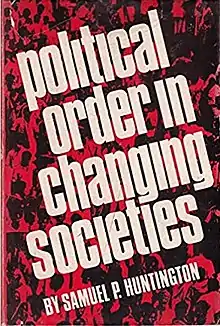Political Order in Changing Societies
Political Order in Changing Societies is a 1968 book by Samuel P. Huntington dealing with changes in political systems and political institutions. Huntington rejected the prevalent and more optimistic modernization theories, arguing that order and stability themselves are crucial objectives in developing countries.[1] As stated by Francis Fukuyama, Huntington argued that political decay was "at least as likely as political development", and that neither "economic nor social development" could proceed without political order, the actual experience of newly independent countries being "one of increasing social and political disorder".[2]

Huntington argues that changes are caused by tensions within the political and social system, and criticizes modernization theory, contending that its argument for economic change and development being the prime factors responsible for the creation of stable, democratic political systems is flawed. Focusing on other factors like urbanization, increased literacy, social mobilization, and economic growth, he stresses that those factors are not significantly related to political development; in fact a major part of his argument is that those processes are related but distinct.[3]
The existence (or lack) of order should not be confused with the issue of the type of that order (both on political level - democratic, authoritarian, and on economic level - socialist, free-market, etc.) While modernity equals stability, modernization is actually a cause for instability, due to urbanization, rising expectations due to literacy, education and the spread of media, etc. In consideration of the 1960s Soviet Union, he considered the United States and the Soviet Union "equally excellent" on grounds of the strong controls imposed by the latter.[4]
Influences
Controversial on first release,[5] and not only in the west, the book is favored by Chinese Neoconservatives. The events of the June 4th incident seemed to confirm to them their belief in a strong state, considering it important in economic growth along the lines of Asian "tiger" economies, and considering China's autocratic model to actually be weak and ineffectual. They continued to draw ideas from Samuel Huntington and his Political Order in Changing Societies in particular; whatever his use as a foreigner who advocated limiting the scope of democracy, his ideas seemed to have merit on their own.[6]
Reviews
Writing in 1997, Francis Fukuyama believed that the book "shaped the understanding of a generation of students on the nature of party systems", though he considers the "characterization of the Soviet Union and other communist states as highly developed polities" odd in retrospect, since "their surface institutional calm masked a high degree of internal rot and illegitimacy."[7]
Writing in 2011, Fukuyama considered that Political Order in Changing Societies "appeared against the backdrop (of) and frontally challenged" the assumptions of "the Americanized version of modernization theory", which included "the sunny view that all good things went together: Economic growth, social mobilization, political institutions, and cultural values", all "changing for the better in tandem." Fukuyama considers the book Huntington's "(most important) contribution to the study of politics", and "probably the last major attempt to write a general theory of political development", though its "significance needs to be placed in the context of the ideas that were dominant in the 1950s and early 1960s. "[8]
References
- Peter Moody (2007), p. 152. Conservative Thought in Contemporary China. https://books.google.com/books?id=PpRcDMl2Pu4C&pg=PA152
- "Samuel Huntington's Legacy".
- Peter Moody (2007), p. 152. Conservative Thought in Contemporary China. https://books.google.com/books?id=PpRcDMl2Pu4C&pg=PA152
- Peter Moody (2007), p. 152. Conservative Thought in Contemporary China. https://books.google.com/books?id=PpRcDMl2Pu4C&pg=PA152
- "Political Order in Changing Societies". Foreign Affairs. 28 January 2009.
- Peter Moody 2007. p.151-152. Conservative Thought in Contemporary China. https://books.google.com/books?id=PpRcDMl2Pu4C&pg=PA151
- "Political Order in Changing Societies". Foreign Affairs. 28 January 2009.
- "Samuel Huntington's Legacy".
External links
- Reviewed by Francis Fukuyama, Foreign Affairs, September/October 1997
- Review author[s]: A. F. K. Organski, The American Political Science Review, Vol. 63, No. 3. (Sep., 1969), pp. 921–922.
- Gordon C. Ruscoe, Comparative Education Review, Vol. 14, No. 3, Papers and Proceedings: Annual Conference of the Comparative and International Education Society, Atlanta Georgia, March 22-24, 1970. (Oct., 1970), pp. 385-386.